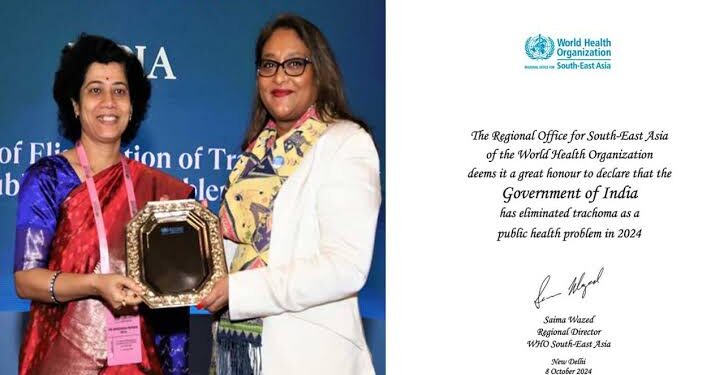New Delhi: India has been officially recognized by the World Health Organization (WHO) for eliminating trachoma, a bacterial eye infection that can lead to irreversible blindness. This recognition places India among the few countries in Southeast Asia, including Nepal, Myanmar, and Pakistan, to have successfully eradicated this public health menace.
Trachoma, caused by the bacterium Chlamydia trachomatis, has long been a leading cause of blindness worldwide. The disease primarily affects the eyes, causing roughening of the inner surface of the eyelids. If left untreated, it can lead to severe pain, corneal damage, and eventually, blindness. The infection spreads through direct contact with eye, nose, or throat secretions from infected individuals, or indirectly through flies that have been in contact with these secretions.
The WHO’s recognition came during the Seventy-Seventh Regional Committee Session held in New Delhi, where Saima Wazed, Regional Director of WHO South-East Asia, praised India’s robust healthcare system and the relentless efforts of its healthcare workers. “India’s success is a testament to the strong leadership of its government and the dedication of healthcare professionals who have worked tirelessly to combat this disease,” Wazed stated3.
India’s journey towards eliminating trachoma began with the National Trachoma Survey Report (2014-17), which declared the country free from infective trachoma in 2017. The comprehensive strategy adopted by India included the WHO-recommended SAFE strategy: Surgery for trichiasis, Antibiotics to clear infection, Facial cleanliness, and Environmental improvement to reduce transmission.
The Union Health Ministry highlighted that the prevalence of active trachoma in children aged 1-9 years is now less than 5%, and the prevalence of trachomatous trichiasis in people aged 15 years and above is less than 0.2%, meeting the WHO’s criteria for elimination.
This achievement underscores India’s commitment to eye health, disease prevention, and universal health coverage. The recognition by WHO not only marks a significant public health milestone but also serves as an inspiration for other countries battling trachoma and similar diseases.
Trachoma is a neglected tropical disease that can cause irreversible blindness if left untreated. Symptoms include itching and irritation of the eyes and eyelids, discharge from the eyes, and sensitivity to light. Advanced stages can cause the eyelids to turn inward, a condition known as trichiasis, where the eyelashes rub against the eyeball, causing pain and further damage.
India’s success in eliminating trachoma is a beacon of hope and a model for other nations striving to combat this debilitating disease.







